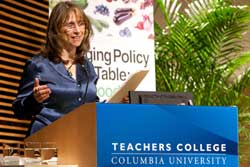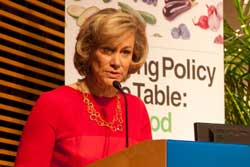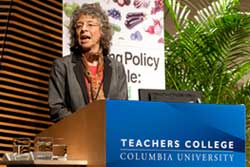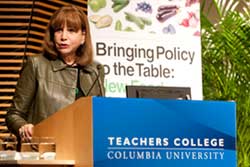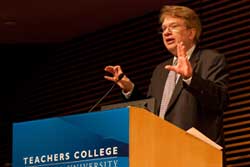Partnering to Make a Difference
In funding a new nutrition center at TC, Laurie M. Tisch extends both a strategy and a longstanding relationship with the College
TC Board of Trustees Vice Chair Laurie M. Tisch, President of the Laurie M. Tisch Illumination Fund, used the recent nutrition conference at TC to unveil a bold new venture by the Illumination Fund to improve healthy food access and combat food-related diseases in New York City. At the heart of the effort is the new Laurie M. Tisch Center for Food, Education & Policy, based at TC.
“Today represents the beginning of a new chapter in TC’s nutrition program, which will provide research, evidence-based programs, policy and training for the next generation of nutrition professionals,” Tisch declared. “It also serves as the launch of the Illumination Fund’s Healthy Food & Community Change Initiative, a major series of grants that vastly expands our commitment to healthy food and healthy choices.”
Rick Luftglass, Executive Director of the Illumination Fund, formally introduced the heads of the other grantee organizations: Michel Nischan, CEO and President of Wholesome Wave: Fruit and Vegetable Prescription Program; Denise Scott, Managing Director, Local Initiatives Support Corporation New York City: Communities for Healthy Food NYC; and Jilly Stephens, Executive Director, City Harvest: Healthy Neighborhoods Initiative.
“These are not just isolated grants,” said Luftglass. “They reflect an intentional strategy that comes out of a very thoughtful process – because we don’t want to just write a series of checks, we want to have an impact.” He added that, in the mode of other successful philanthropies, the Illumination Fund sees its role as “catalytic rather than changing things en mass. We can forge partnerships and be nimble, and not wait for a public referendum.”
Noting that the conference was being held on Valentine’s Day, TC President Susan Fuhrman saluted all the couples in the audience and also hailed the power of intellectual pairings – including “the study of nutrition education and its application to policy.”
Fuhrman noted the College’s “demonstrated track record of providing evidence relevant to policy,” a form of service, she said that “nobody does better than Teachers College.” That legacy continues, she said, with last year’s founding of a new academic department at the College, Education Policy and Social Analysis (EPSA).
Fuhrman also reminded her listeners that TC was the birthplace of the nutrition education field.
“In 1909, TC began building the road that leads us to today” with education focused on “the very idea of how food contributes to health and growth,” she said.
Now, Fuhrman said, the College’s interests in both policy and nutrition work are converging through the new Laurie M. Tisch Center for Food, Education & Policy.
“There is no one we’d rather partner with in this work than one of TC’s biggest supporters and one my closest advisors, Laurie Tisch,” Fuhrman said. She described Tisch as someone whose “commitment to New York City, from healthy food to education, from civic service to the arts and beyond, is clearly inspired by a vision of a fair, just and vibrant city.” The College is “honored that she has made us a key partner in her healthy food and community change initiative, and we’re enormously grateful for her inspiring gift to establish the Laurie M. Tisch Center for Food, Education & Policy.”
Isobel Contento, TC’s Mary Swartz Rose Professor of Nutrition Education, said the new Center will “train the next generation of nutrition professionals at the master’s degree and doctoral levels, providing them with competency in both nutrition education and policy work.” In the latter area, “we are fortunate to have EPSA as our partner,” Contento said, adding that the Center would also “draw on the expertise of our colleagues in [TC’s] Department of Health and Behavior Studies.
Contento also paid special tribute to Joan Dye Gussow, Professor Emeritus of Nutrition Education, who was attending the conference.
“Back in 1970, Joan was already talking about the importance of focusing on food and sustainable food systems at a time when the profession was focused on nutrients,” Contento said. “We’ve heard today from elected officials that they’re finally catching up with her.”
At Contento’s urging, Gussow rose and waved to the audience, which showered her with loud applause and cheers.
Pamela Koch, Executive Director of the new Laurie M. Tisch Center for Food, Education & Policy, said that bringing education and policy together would require not only providing people with access to good food, but also providing them with the right kind of motivation.
“People need to really believe that healthy eating is worth it,” said Koch, who is also Adjunct Associate Professor of Nutrition Education at TC. To illustrate her point, Koch imagined a high school student, whom she called Danny, who drinks several bottles of soda every day. Danny starts noticing New York City’s recent “Are You Pouring on the Pounds?” advertising campaign, which seeks to discourage consumption of sweetened beverages. Then he learns in a course at school what happens in the body from too much consumption of sugar. He, gives up soda, buys a water bottle from an environmental group extolling the virtues of fresh water, and uses it for his daily supply of H2O.
Averring that poor neighborhoods across the country are being harmed by “an over-abundance of cheap, unhealthy foods” linked to heart disease and type 2 diabetes, Koch called “access to healthy food “a right that all of our fellow citizens and families deserve, regardless of zip code.”
Published Saturday, Feb. 23, 2013
